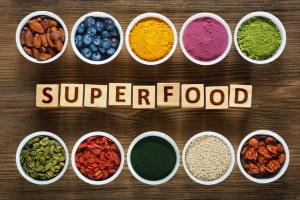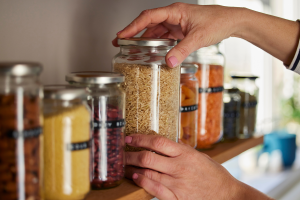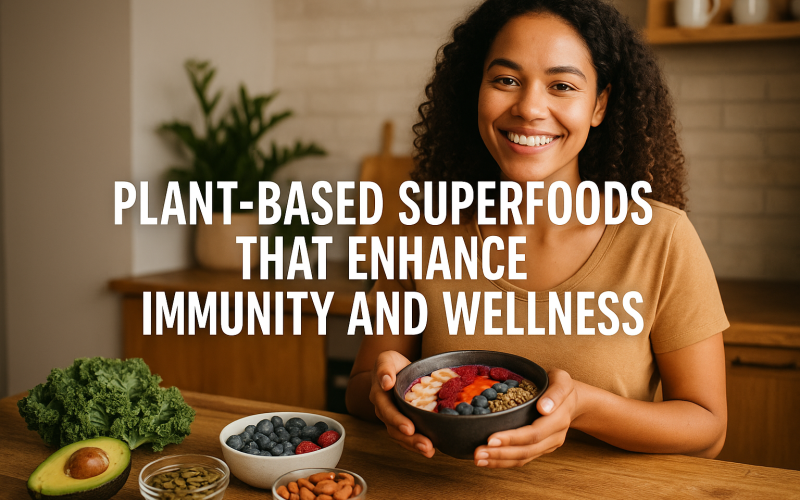Introduction
A strong immune system does more than fend off winter colds—it keeps energy high, skin clear, digestion smooth, and mood steady all year. While genetics and sleep play roles, daily food choices remain the quickest lever you control. Plant-based superfoods pack dense vitamins, minerals, antioxidants, and fiber in every colorful bite. Better yet, they are easy to find in local markets and simple to fold into familiar meals.
This guide highlights ten science-backed superfoods that lift immunity and overall wellness. You will learn why each food works, how much to eat, and fast ways to add it to breakfast, lunch, or snacks. Recipes use everyday kitchen tools, and nutrient tables help you track macro and micro goals without complicated math. Let’s nourish defense and delight taste buds at the same time.
How Plant Superfoods Support Immunity

Micronutrient Density
Vitamins C, A, E, and minerals like zinc or selenium power white blood cells and antioxidant enzymes. Superfoods deliver higher amounts per calorie than ultra-processed snacks.
Phytochemicals
Plants make colorful compounds—flavonoids, carotenoids, anthocyanins—to protect themselves from sun damage. When you eat them, the same molecules reduce oxidative stress that can weaken immune response.
Gut Health Link
Seventy percent of immune cells live in the gut wall. Fiber-rich foods feed good bacteria, creating short-chain fatty acids that calm inflammation and sharpen defense signals.
Top 10 Plant-Based Superfoods for Immunity

1. Kale
Why It Helps
• One cup raw offers 80 mg vitamin C (daily target met) and high vitamin K for tissue repair.
• Lutein and zeaxanthin shield eye and skin cells from free radicals.
Easy Uses
Blend into green smoothies, massage with olive oil for salads, or bake 10-minute kale chips with sea salt.
2. Blueberries
Why It Helps
• Rich in anthocyanins that increase natural killer (NK) cell activity.
• Fiber slows sugar spikes, balancing energy.
Easy Uses
Top oatmeal, mix into yogurt, or freeze portions for cool summer snacks.
3. Garlic
Why It Helps
• Allicin compound shows antiviral and antibacterial properties in lab studies.
• May shorten cold duration when consumed daily.
Easy Uses
Crush cloves, let rest 10 minutes to activate allicin, then stir into hummus or roast whole bulbs for mellow spread.
4. Turmeric
Why It Helps
• Curcumin is a strong anti-inflammatory antioxidant.
• Works synergistically with black-pepper piperine—boosts absorption 2000 %.
Easy Uses
Simmer ½ teaspoon in plant milk for “golden latte,” sprinkle on roasted veggies, or whisk into salad dressing.
5. Citrus Fruits (Oranges, Grapefruits)
Why It Helps
• High vitamin C boosts neutrophil function and collagen repair.
• Contains hesperidin, a flavonoid that may modulate immune signaling.
Easy Uses
Segment into leafy salads, freeze juice in ice trays for smoothie cubes, or pair grapefruit with avocado toast.
6. Pumpkin Seeds
Why It Helps
• Provide zinc—key for T-cell development—and plant omega-3 ALA.
• Magnesium aids muscle recovery and sleep quality.
Easy Uses
Toast with tamari for savory topping, grind into pesto, or add to overnight oats.
7. Shiitake Mushrooms
Why It Helps
• Beta-glucans stimulate macrophages and dendritic cells.
• High ergothioneine antioxidant protects DNA.
Easy Uses
Sauté with garlic, add to miso soups, or marinate and grill as burger patties.
8. Ginger
Why It Helps
• Gingerol reduces oxidative stress and soothes the gut, an immune hub.
• Mild blood-thinning promotes healthy circulation of immune cells.
Easy Uses
Steep 1-inch slice in hot water for tea, grate into stir-fries, or blend into fruit smoothies for zing.
9. Almonds
Why It Helps
• Vitamin E acts as a fat-soluble antioxidant guarding cell membranes.
• Protein and healthy fats keep you satiated, dampening sugar cravings that can impair immunity.
Easy Uses
Snack on ¼ cup roasted almonds, blend into homemade almond butter, or sprinkle on steamed greens.
10. Fermented Kimchi
Why It Helps
• Live Lactobacillus cultures boost gut microbiome diversity.
• Contains vitamin A and C plus capsaicin for extra metabolic kick.
Easy Uses
Add to grain bowls, use as probiotic sandwich topper, or chop into veggie fried rice near the end of cooking.
Weekly Meal Planner Using Superfoods
| Day | Breakfast | Lunch | Dinner | Snack |
|---|---|---|---|---|
| Mon | Blueberry–kale smoothie | Quinoa salad with citrus and pumpkin seeds | Lentil curry with turmeric rice | Almonds + orange |
| Tue | Ginger oatmeal w/ almond butter | Mushroom–kale miso soup | Grilled tofu + kimchi slaw | Garlic hummus + carrots |
| Wed | Citrus chia pudding | Avocado grapefruit toast | Stir-fry veggies with garlic + ginger | Kale chips |
| Thu | Turmeric latte + banana | Buddha bowl topped with pumpkin seed pesto | Shiitake burger, sweet-potato fries | Blueberry yogurt |
| Fri | Overnight oats with almonds | Warm kale–citrus salad | Coconut curry with mushrooms | Kimchi on crackers |
| Sat | Green smoothie bowl | Whole-grain wrap with gingery chickpeas | Garlic lemon pasta + side salad | Fresh orange slices |
| Sun | Cinnamon quinoa porridge | Tomato-turmeric soup | Veggie tacos with kimchi | Dark chocolate + almonds |
Rotate ingredients for variety and nutrient balance.
Shopping and Storage Tips

- Buy kale and citrus on sale; wash, chop, and freeze for smoothies.
- Keep turmeric and ginger roots refrigerated up to three weeks; slice and freeze extras.
- Store nuts and seeds in airtight jars in the fridge to prevent oxidation.
- Choose kimchi with “live cultures” on label; keep cold to preserve probiotics.
Simple Food Safety Reminders
- Rinse leafy greens under cold water to remove soil microbes.
- Use separate cutting boards for vegetables and any raw animal products to avoid cross-contamination.
- Do not heat fermented foods above 118 °F if you want to keep probiotics alive.
Lifestyle Factors that Boost Superfood Impact

Sleep
Aim for seven to nine hours; immune proteins called cytokines rise during deep sleep.
Movement
Even 30-minute brisk walks improve circulation, transporting antioxidants where needed.
Stress Control
Chronic stress releases cortisol, lowering lymphocyte count. Use breath work, yoga, or outdoor time to balance.
Frequently Asked Questions
Do I need exotic powders?
Whole supermarket produce is enough. Powders can help when fresh supply is limited, but read labels for added sugars.
Can I overdose on certain phytochemicals?
Rare when eating whole foods. Very high supplements may interact with medication—consult a doctor.
Are frozen berries as good as fresh?
Yes. Flash-frozen berries often retain more vitamin C than fresh berries shipped long distances.
Conclusion
Plant-based superfoods—kale, blueberries, garlic, turmeric, citrus, pumpkin seeds, shiitake, ginger, almonds, and kimchi—deliver concentrated nutrients and powerful phytochemicals that fortify immune cells, curb inflammation, and nurture a healthy gut. By weaving these foods into simple meals and pairing them with restful sleep, daily movement, and stress balance, you build a resilient body ready to handle seasonal bugs and everyday demands. Small daily servings beat occasional mega doses, so stock your pantry, prep smart, and enjoy vibrant flavors that protect from within.
Call to Action: Choose two superfoods from this list and add them to tomorrow’s breakfast or lunch—your immune system will thank you bite by bite.












